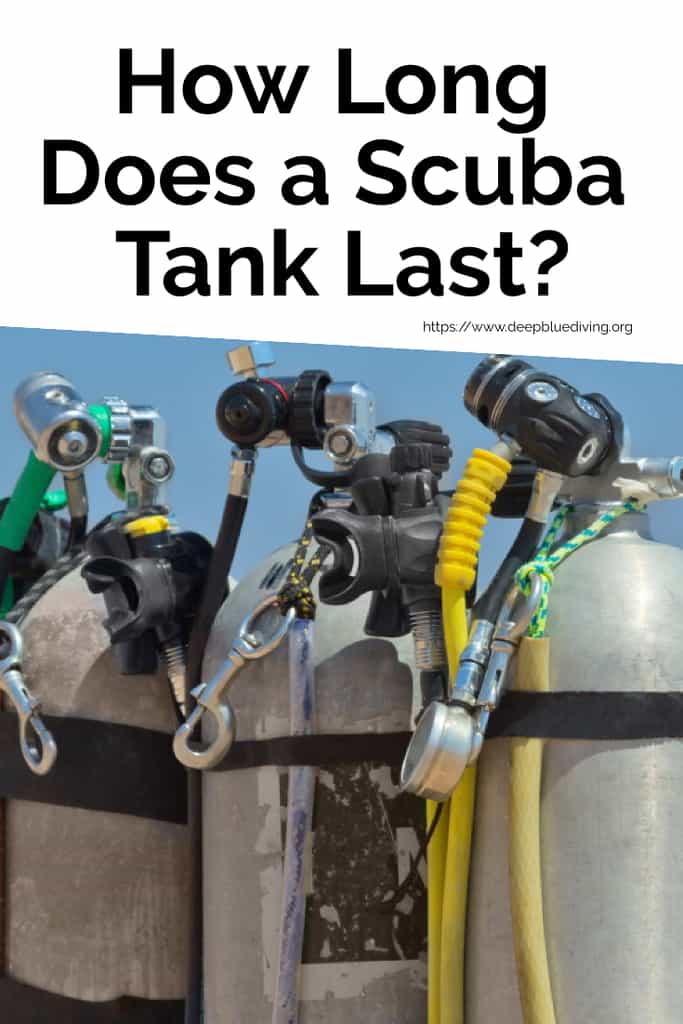How Long Does a Scuba Tank Last When You Dive Underwater?
Scuba tanks are the only source of air for scuba divers. When you’re underwater, you have to keep an eye on your air supply to ensure that you return to the surface before you run out. But how long does a scuba tank last? The amount of time it takes for your tank to become completely empty is based on a number of factors such as the depth of your dive, whether you’re a pro or a beginner, and the size of the tank you’re using. Lastly, your personal air consumption rate will play a role in the time you have available underwater.
How long does a scuba tank last? That depends on a number of factors including the tank volume, depth of your dive as well as your air consumption. There is no clear answer that can be given as the variables have an enormous impact on the length that you will have your scuba tank last.
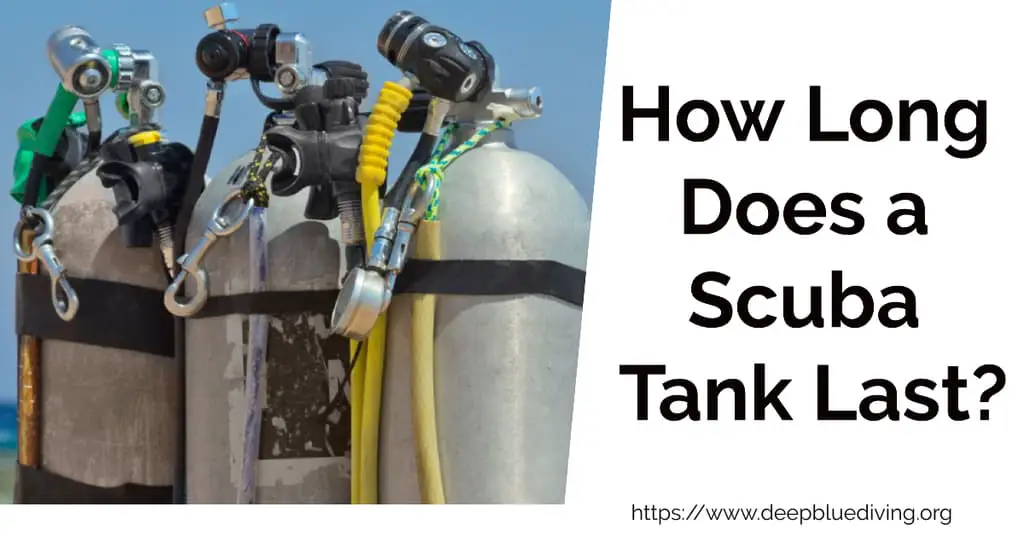
What Factors Determine How Long the Air in a Scuba Tank Lasts
From depth to tank size to your personal air consumption rate, a number of factors affect how long the air in a scuba dive tank lasts:
The Volume of the Tank
The standard-sized tank holds around 80 cubic feet of air that is compressed to around 3000 psi. Tanks may be made of different materials like steel or aluminum to cater to the many different types of divers.
Deep divers ideally opt for tanks with a higher internal volume. Divers who don’t require too much air may opt for a smaller tank, which is lighter and easier to carry underwater. Generally, a large tank with a high volume tends to last longer underwater.
It won’t make any difference in dive time whether you’re looking at steel or aluminum tanks. You get the same tank sizes no matter what material is used. The air in the tank will last the same amount of time.
How Does Air Consumption Impact Dive Time?
A scuba diver’s air consumption rate determines how long a standard air tank will last them underwater. Tall (and large) people generally need more air than petite (and short) people.
Apart from size, several factors affect an individual’s air consumption rate such as stress level, expertise, buoyancy control, and the effort exerted in a particular dive. Instructors usually guide divers to breathe slowly and deeply to lower their air consumption rate.
Impact of Fitness on your Dive Time
When your body is in good shape, your muscles are relaxed and you don’t need to exert extra effort to breathe properly. This also explains why most basic dive certifications start with basic swimming classes before the students are fit enough to dive deeper into the water.
Being in good shape, therefore, reduces air consumption and enables you to dive longer with the same amount of gas in your tank.
Does Depth Impact How Long a Tank Lasts?
Water pressure increases the deeper you go in the water. The greater the pressure, the denser your environment. In the water, the deeper you go, the denser the water becomes, and since gas molecules are so tightly packed, you need to work harder to regulate your breathing.
Shallow Diving
Even if you’re in waters as shallow as 10 meters (33 feet) deep, the pressure is double and you need to put in twice as much effort to breathe. At 20 meters, the pressure is tripled. The deeper you dive, the more effort you need to exert to breathe, which means that you consume your available air faster.
Impact of Depth on Dive Time
At around 10 meters or 33 feet, a diver’s tank can, on average, last for about an hour. At around 40 meters, the tank will last for a few minutes. Professional divers can make their air supply last twice as long by controlling their breathing (beginners tend to breathe harder as they try to get the hang of being underwater) and their motion to save as much energy as possible.
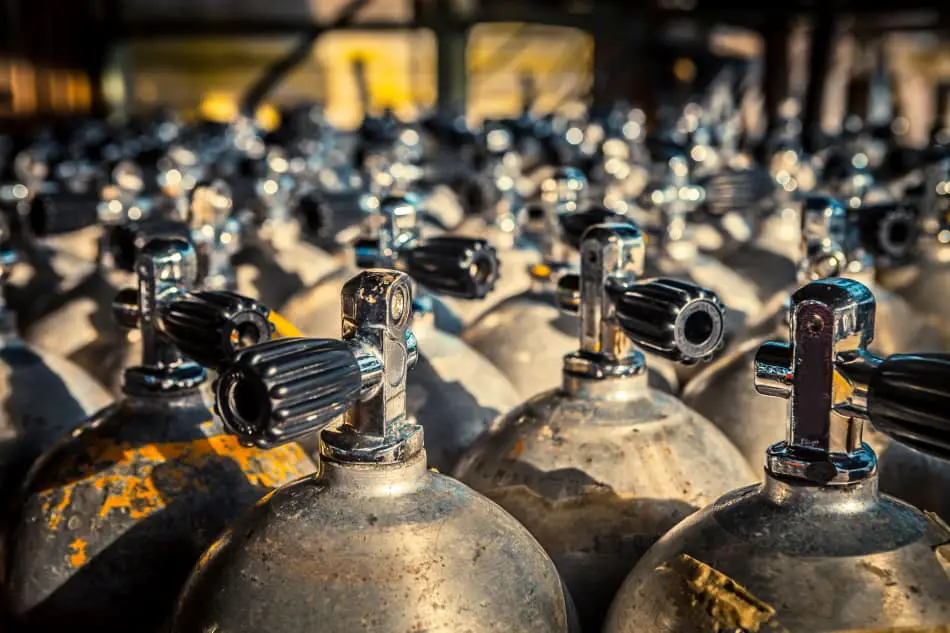
What are Common Scuba Tank Sizes?
Scuba tanks vary in size and the size determines how much air supply you’ll have underwater and how long it’ll last you. The standard cylinder size is around 12 liters (200-bars).
How Much Air Does a Tank Contain?
As mentioned earlier, a standard 6.5 LB tank holds around 80 cubic feet of compressed air at 3000 psi (LB/PSI). Commercially, scuba tanks are identified based on their volume in liters. The standard is around 12 liters, which is a little less than the afore-mentioned values, but it is easier to round off the numbers. Tanks also come in smaller and bigger sizes such as 8 liters, 10 liters, 15 and 18 liters.
The larger the tank, the more air it will contain, and your supply will last longer. Of course, you can’t just base your decision on the tank size. If you’re unable to carry the weight, it’ll be impossible for you to move around if you’re lugging a 15-liter tank with you. Physical strength and size must also be taken into account during tank selection. Underestimate your strength to avoid facing problems underwater. It is a good idea to test the weight of the tank on land before diving straight into the ocean.
For beginners, it is advised to start off with a smaller tank, especially since they’ll only be doing shallow dives initially. Once they move on to deep diving, they can opt for larger tanks.
What Influence Does the Pressure in the Tank Have?
Tanks have a stamp near the top edge to signify how much compressed air they can hold. The greater the air pressure in your tank, the longer you’ll be able to breathe underwater. However, there’s a catch.
By consuming high-pressure air, you are likely to enter your decompression zone much earlier than the standard depth (around 20 feet). If you plan on using high-pressure air during your dive, you’ll have to keep a close eye on your dive computer (or your dive tables) to ensure that you make the necessary decompression stops and avoid the risk of getting decompression sickness (characterized by joint paints, etc.).
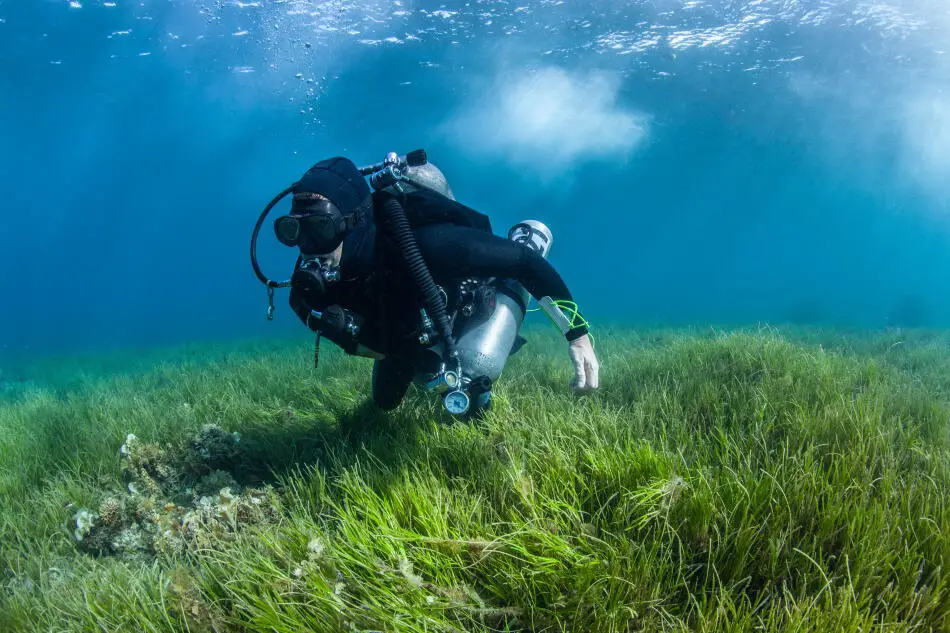
Do Smoking or Asthma or Other Lung Diseases have an Impact?
Smoking and other lung-related problems like asthma greatly impact a diver’s body. It doesn’t matter whether you smoke one cigarette or one packet a day, it will impact your breathing ability underwater and how long the air lasts.
Cigarette consumption reduces the oxygen content in the body and increases the intake of carbon monoxide. The human body naturally generates a small amount of carbon monoxide, but the amount inhaled through cigarette smoking is significantly greater. It fixes itself onto your red blood cells and takes up the space that is generally taken up by oxygen in a non-smoker’s body.
Smokers may face shortness of breath on land, which only becomes more pronounced once they’re underwater. Smokers may find it difficult to breathe through their contracted lungs and are likely to use up their air supply in half the amount of time it would last a non-smoker.
What Are Twin Tanks?
Twin tanks are becoming popular among recreational divers nowadays. Essentially, twin tanks function the same way as a regular tank and have a single control source, but if you switch off the supply from one tank, the other will still keep supplying air. This makes divers more self-reliant, especially in cases of emergency.
Moreover, a twin tank provides a greater gas supply without increasing the weight. Twin 8-liter tanks supply more air than a single 12-liter tank and the two roughly weight the same.
For divers diving multiple times on the same day, twin tanks are a more convenient option. This is because where a single tank scuba diver must leave their scuba diving tank with its remaining supply on the shore and carry a fresh tank, a scuba diver with a twin tank can keep diving with the same pack if one is full and the other still has some supply remaining. This makes diving with a twin tank more economical.
Twin tanks also feature a back plate and a wing buoyancy device that help divers maintain their horizontal position underwater and make them glide better.
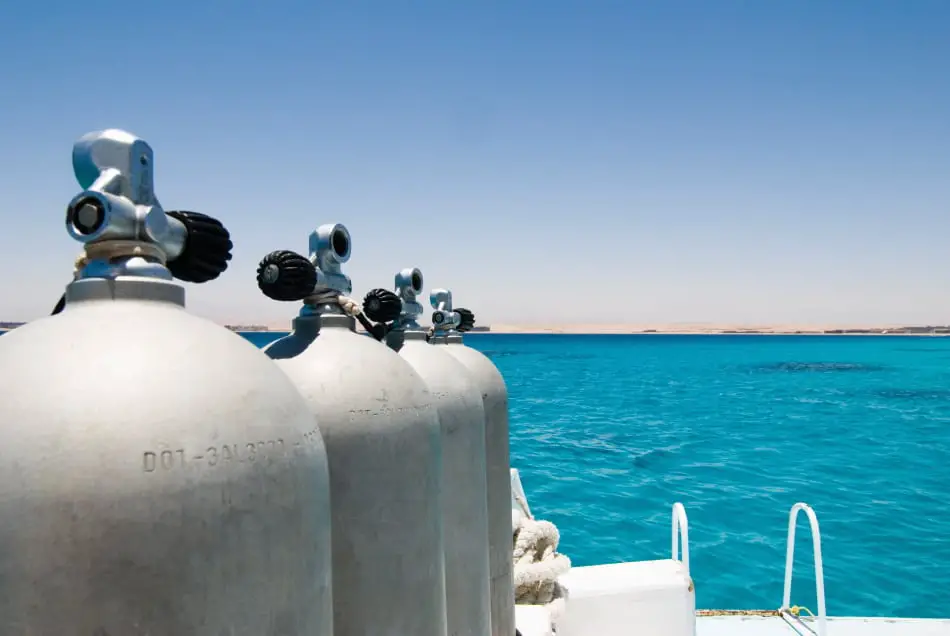
Final Thoughts
There’s no ballpark figure for how long a scuba tank lasts. It may last for 10 minutes, an hour, or even an hour and a half based on many variables such as your tank size, your physical strength, the amount of time you’ve been diving for, and the depth to which you’re diving. The time or how long does a scuba tank lasts does depend on your personal air consumption rate.
To give you an answer to how long will your scuba tank last would be completely inaccurate. How long your tank will last for a large portion depends on your air consumption rate as well as the tank volume. Depending on how many cubic feet of air you have in your tank does determine how long will your scuba tank last.
Deep divers tend to use larger tanks and have the proper training to regulate their breathing to reduce their air consumption so that they don’t waste their air supply. Shallow dives to around 33 feet (10 meters) require less air and can therefore last longer than if you go down to 100 feet.
For newbies still trying to get comfortable in the water, small tanks are ideal. Your dive instructor will provide with all the necessary information on the right way to breathe underwater (slow, deep breaths) and a rough estimate of the amount of time your tank will last you at a given depth.
Just remember, that your air supply for scuba diving is not the only factor that determines how long you can stay in the water: you need to be aware of your decompression limit to avoid consuming too much compressed nitrogen, which can lead to decompression sickness.
